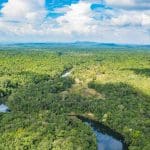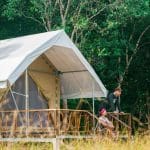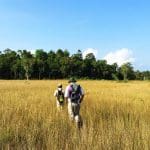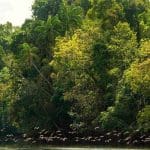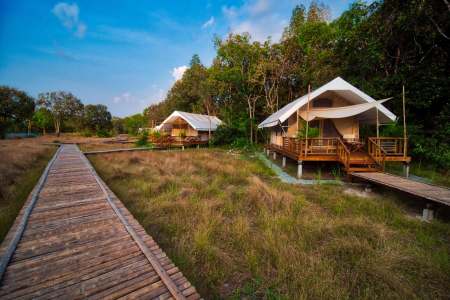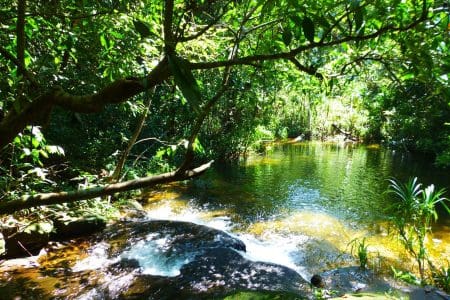A pioneering sustainable tourism project is making its debut in the heart of the Cambodian jungle. Marissa Carruthers finds out from Willem Niemeijer how a stay at the Cardamom Tented Camp could make or break 18,000 hectares of pristine nature.
How did the idea for the Cardamom tented camp come about?

YAANA Ventures was approached by Minor Hotel Group, who wanted to create a viable economic activity on its 180km2 concession of natural forest and grassland in the Cardamom Mountains that they were protecting. A condition of the Cambodian government is that the land is used for an economic activity. Surrounding concessions have unfortunately resorted to logging the native forest and planting hectares of ecological mono-culture – either palm oil or rubber plantations, which are a disaster for wildlife. Minor Hotel Group, through the Golden Triangle Asian Elephant Foundation, had held the concession for four years but realised they had to start economic activity. The idea of a tented camp focused on nature conservancy came up as a viable option. Minor Hotel Group was aware that YAANA Ventures had had success running the tented camp at Banteay Chhmar in Banteay Meanchey province with the local community. We also run the Anurak Community Lodge in the forest of Khao Sok National Park in southern Thailand, so we had the credentials and experience to work with Minor Group, GTAEF and Wildlife Alliance on the new Cardamom Tented Camp.
How did you transform this idea into reality?
This couldn’t have become reality without the enthusiastic backing from the highest echelons of Minor Hotel Group. In addition, John Roberts, of the Golden Triangle Asian Elephant Foundation, has in particular been of support. Besides that, a willingness to get out to the “front lines” is key to the success. The project planners and workers are in the sticks for months on end, they need to be reminded of the importance of their job. You cannot outsource motivation.
What challenges did you have to overcome?
Logistics and provisioning. The Cardamom Tented Camp is very remote: four to five hours from Phnom Penh or a 90-minute drive to the Thai border, and then it’s an additional one-hour boat ride up the Preak Tachan River to get to the camp. Getting construction materials there was one thing. We also needed managers and workers who had to love “roughing it” for months. I believe the uniqueness of this project, and our aim to support nature conservation, rallied everyone to the cause.
Why did you chose the parcel of land at Botum Sakor National Park?
When searching for the ideal spot, we used the Preak Tachan Ranger Station as our base. After all, the plan was to have guests join rangers on their patrols. We looked at various locations, until we got to a flat grassland clearing right off the Preak Tachan River. To build the camp without having to cut down any trees was perfect. The stunning grasslands were the logical place to build nine elevated tents.
For more ideas on what to do in the Cardamom Mountains, read Marissa’s experience of getting Lost in the Cardamom Mountains.
What makes this experience so unique for guests?
There is real remoteness. There are no roads, villagers or human noise nearby. Guests get a clear sense of this by taking the one-hour boat trip into the thickening jungle. In Southeast Asia, in particular, it’s hard to get so remote, so immersed in nature, yet in comfort. Being surrounded by 18,000 hectares of nature that you help protect from poaching and logging is definitely unique. On the boat trip to the camp, guests will often see kingfishers, storks, macaques and the occasional eagle.
How is the initiative helping the local community?
Cardamom Tented Camp is a not-for-profit venture with any revenues being reinvested into the camp. We create local employment. Most importantly we are honestly and correctly telling our guests that “your stay keeps the forest standing” – which it does. The success of Cardamom Tented Camp ensures that the forest and wildlife, such as elephants, leopards, dhole Asian wild dog, gibbons, civets and more, can survive. Our partners, Wildlife Alliance and GTAEF, have done an excellent job in funding forest rangers who have removed many poachers’ traps over the last three years. Wildlife Alliance camera traps suggest that larger mammals are now increasing in numbers, most notably dholes.
Eco- and sustainable-tourism are buzz words right now. How do you define true experiences that fall into this category?
The Cardamom Tented Camp is in a category of its own: conservation tourism. Guests are a vital part of our conservation effort. Without the camp, the rights to the concession could lapse, which would be a disaster. In that core sense, staying at Cardamom Tented Camp is a truly sustainable ecological experience. Especially if you consider we have installed our own solar panels and grey water recycling process with zero discharge back into the Preak Tachan River. There are no motorised activities, only hiking, canoeing, bird watching and the like. When you step out of your tent in the middle of the night, the black sky is beautifully lit up by a million stars – the benefit of having no human habitation nearby. We are really communing with nature here.
Are there any plans for the future?
Our objective is to successfully open and run the Cardamom Tented Camp and establish it as the leading example for sustainable conservation tourism in Southeast Asia. We continue to work also on our other projects, Anurak Community Lodge on southern Thailand and GROUND, to show that tourism can be a force for good. We’re definitely not done, but our focus now is on making Cardamom Tented Camp a resounding success.
What activities can guests do?
A range of two- to four-day inclusive packages are available for guests who want to add a rewarding nature eco-experience to their next trip to Cambodia or Thailand.
For more information, visit their website.
